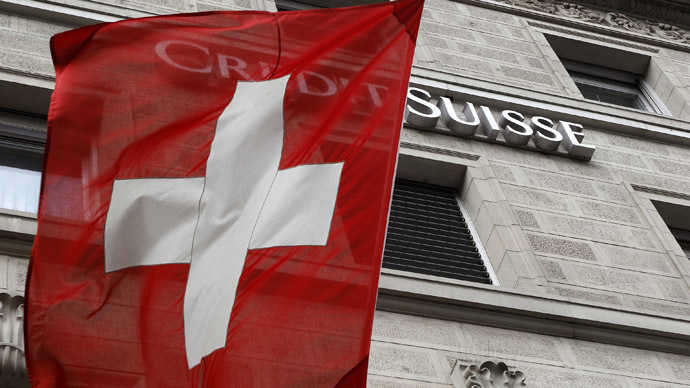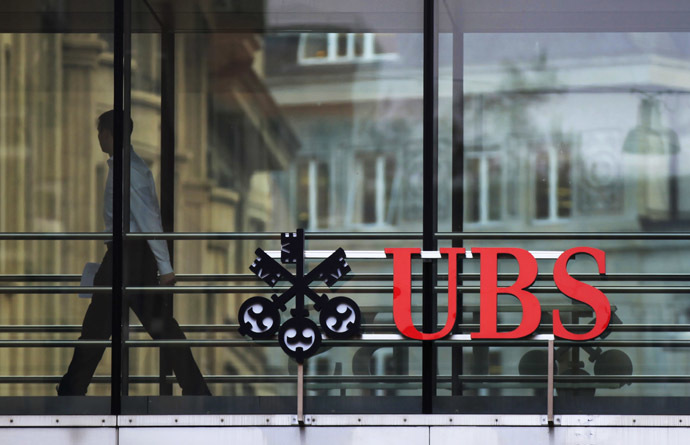If you think the world of banking will become utterly transparent – that’s false

Under pressure from Western governments, Switzerland has revoked some of its outdated banking secrecy laws, but it won't make the world of banking utterly transparent, Patrick Young, Executive Director of DV Advisors, told RT.
We spoke to Patrick Young after Switzerland, the world’s largest
offshore wealth center, worth an estimated $2.2 trillion in
assets, on Wednesday signed an agreement to share financial
information with nearly 60 countries.
RT:How would you assess this step? Will it have any
impact on tax evaders?
Patrick Young: It's a very interesting move from a general sense
of natural justice; it seems entirely logical. Why should certain
people be allowed to open bank accounts in somewhere like
Switzerland, avoid paying any tax on the money, take it out of
the country in which they were earned it and so on?
RT:Therefore there's a strong logic in that sense. At
the same time we have to have an eye on history, why do the Swiss
have such strong privacy laws and private banking laws?
PY: Actually, they were developed in 1944 as a reaction to
the Nazis in Germany. They were in attempt to try and help
fleeing refugees stop having their money being confiscated by
Adolf Hitler.
Of course at the same in the modern era people are very
concerned. Governments dosn't have enough money to function, it's
becoming increasingly difficult to raise more money whether you
are in the US or Western Europe. And therefore there's been this
big move toward some degree of transparency and forcing
Switzerland to open up.
And frankly large Swiss banks had this coming to them. You had
people like UBS and CreditSwiss opening massive branches in US
cities such as New York.
In the middle of Manhattan there was a complete city block
effectively devoted to UBS's private banking division. It was
ludicrous to think that in some shape or form the IRS, the
American tax authority, wasn't going to get interested in what
was going on in that particular building. There were of course
scandals, people smuggling in, rather James Bond-style, diamonds
in toothpaste tubes that were brought in by private bankers from
Switzerland to the US.
RT: How does Switzerland stand to benefit from this?
Could it lose investors?
PY: Switzerland essentially stands to lose a great deal,
because of course it has massive banking operations. The banking
industry in Switzerland is way larger – way, way larger than even
the size of the banking industry in London, the major financial
capital of Europe. Therefore there could be obviously massive
amounts of funds that would suddenly disappear from all of the
cantons and Geneva, and that would obviously harm the Swiss
economy.

RT:Financial hubs such as Luxemburg and Singapore
joined the convention on international sharing of bank data in
May. Has anything changed for them since then?
PY: I think there is a big difference with a hub such as
Singapore – they were significantly sized to begin with, they did
not have the same critical cash mass as Switzerland had,
therefore their banking business has not been hugely harmed.
It's important to understand that if you look at the world of
banking per se, what's happened now is that the names of private
bank accounts will be shared. If I should happen to be so lucky
and have a private Swiss bank account, that information could not
be transmitted to tax authorities around the world. However,
corporate bank accounts will still be subject to a large degree
of secrecy, because they have bearer shareholders, because they
have some form of a trust structure involved. So the idea that
suddenly the lights will go on in the world of banking and
everything will become utterly transparent is false.
RT:Could this improve the situation in the eurozone in
terms of governments recovering lost tax?
PY: The situation in the Eurozone, much like in the USA,
is that the government is actually alcoholic – it drinks too much
vodka, it wants ever more vodka and no matter what happens it
seems to consume endless amounts of vodka. In other words, it's
the government spending. Governments are spending too much
throughout Western Europe and in the US they simply cannot afford
to go on with that sort of spending.
Therefore we have this ludicrous nirvana approach, with the
belief that ending the anonymous private banking in Switzerland
is suddenly going to see us have a huge wall of money appear to
pay for the government. The truth is that even if all of that
money is repatriated, it would not be enough to save the
governments from having to go through more austerity and cutting
back their spending.
The overall reality is that no matter what you do in these
circumstances money would tend to leave the countries that tax it
too highly. And therefore Western Europe has a huge crisis,
because it would be much easier for us all to go and live in
Moscow and pay only the 13 per cent flat rate tax, compared to
the swinging rates that are being charged in Western Europe at
the moment.
In that sense, there’s clearly an issue here that simply evolving
the banking system as we have done removes certain wrinkles, but
will it cure the ongoing eurozone problem? Of course not. The
eurozone needs to cure it itself, not look for outside panacea.
The statements, views and opinions expressed in this column are solely those of the author and do not necessarily represent those of RT.
The statements, views and opinions expressed in this column are solely those of the author and do not necessarily represent those of RT.













